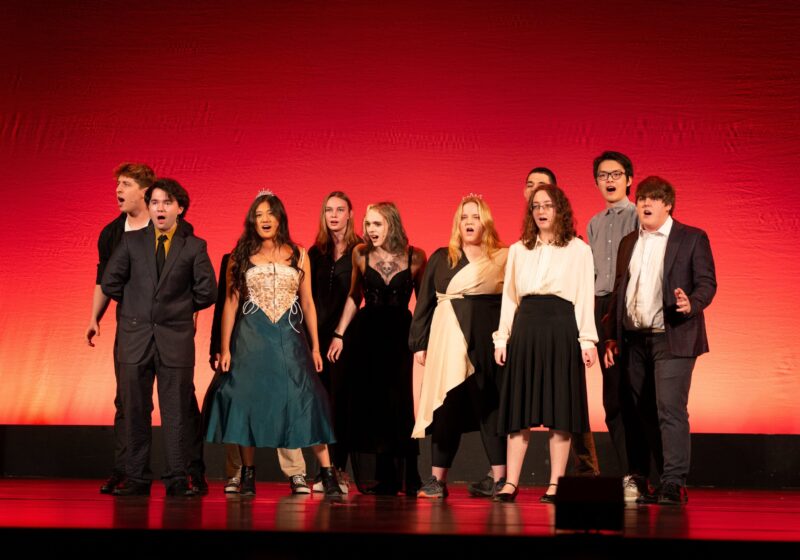Rochester Mayor Robert Duffy’s efforts to take mayoral control of the Rochester City School District took center stage at UR last Thursday night.
A packed Dewey lecture hall with an audience consisting of undergraduates, Margaret Warner Graduate School of Education and Human Development students and a wealth of community members, including teachers heard from a panel of education experts and discussed potential merits and issues of a Rochester City School District run by the mayor.
‘Press coverage on the proposal for mayoral control of the school district has raised lots of questions among local educational stakeholders,” Director of the Urban Leadership program and organizer of the teach-in Ed Brockenbrough said, laying out the agenda and impetus for the evening gathering.
‘This teach-in is intended to provide information and insights that will help individuals reach their own understandings on the issue at hand.”
Duffy’s proposal regarding the Rochester City School District would allow him significant oversight in the school district. In addition it would give Duffy control over the RCSD budget.
The teach-in provided a wealth of information about the intricacies of mayoral control and the legislative process needed to approve Duffy plan, which he hopes will happen in time for the next school year. But the theme of the teach-in deviated to include a broader fundamental discussion about poverty and democracy in the context of poor graduations rates.
‘The call for mayoral control of the schools diverts our focus from examining the real focus of our current problems,” Warner Associate Professor David Hursh said. ‘While knowing the city school district’s graduation rate is important, we should be asking other questions: What percentage of Rochester’s adults have jobs that pay a wage that can support a family? What percentage [of children] live in poverty?”
Hursh also voiced concerns that democracy was being undermined, noting that Duffy had postponed community forums until the legislation was introduced. In a Democrat and Chronicle article, Duffy was quoted as saying he would not have full answers for the community until the reform was passed and did not want to misinform his constituents.
The panelists found common ground on the topic of democracy. Principal of Rochester’s School Without Walls program Dan Drmacich agreed with Hursh’s concerns.
‘This proposal for mayoral control symbolically diminishes democracy, not only for those in the community, but also for teachers and principals,” he said.
Drmacich went a step further by illustrating the impact of the limits of democracy to students.
‘What’s this modeling for kids?” he said. ‘How actively are they going to be involved as citizens themselves?”
Drmacich, whose School Without Walls program has the highest attendance rate of secondary schools in the city, also feared that mayoral control would limit the development of innovative schools. Drmacich’s idea of innovative schools included places where students could spend half a day as an apprentice and study more specialized subjects in the afternoon.
‘As long as the mayor and the Board of Education or superintendent exists within our school districts, you are going to have the continuation of the lack of development of innovative schools,” he said.
Finally, Assistant Director of the David T. Kearns Center Anthony Plonczynski offered a somewhat different perspective, expressing concern that Duffy’s plan was moving along too quickly. Recent development projects, such as the Renaissance Square development and the ferry project, were given priority by Duffy’s administration, something Plonczynski sought from Duffy.
The panelists’ discussion took up most of the presentation, but the emotion from the gallery in the question and answer period underscored community members anxiety to get something done on the issue. Rev. Charles Thurman, pastor of the Second Baptist Church in Mumford, who is active in the movement against the mayor, agreed with many of the panelists that poverty is a fundamental problem.
‘Poverty is one of our biggest issues,” he said during the discussion period. ‘We’ve got to do something about poverty if we’re serious about our city.”
‘I think that the teach-in was a success because it created a space for folks at Warner as well as the University-at-large to enter into the conversation,” Brockenbrough said afterward.
UR senior Dan Grenell attended the teach-in to learn more about the issue.
‘I’ve only read news articles about it, I hadn’t looked in depth into the issue,” he said, adding that he particularly enjoyed Principal Drmacich’s perspective.
Brockenbrough who didn’t have any idea about when another potential mayoral control teach-in would be held added that although he reached out to panelists who would be potentially pro-mayoral control, many were either unable to or declined to come.
‘A definite gap was having some decidedly pro-mayoral control voices participating in the conversation,” he said.
The community, many of whom issued an impassioned plea for some UR faculty to come speak at neighborhood gatherings, still remains active.
On Tuesday night, Professor Hursh spoke at a community event at the Helping Hands Baptist Church.
Additionally, State Representative Joseph D. Morelle canceled a Monroe County Democratic Committee Volunteer recognition dinner because he was concerned that parents and community members were scheduled to protest mayoral control. On Wednesday night, protestors gathered at the Holiday Inn Airport as predicted.
Willis is a member of the class of 2011.





